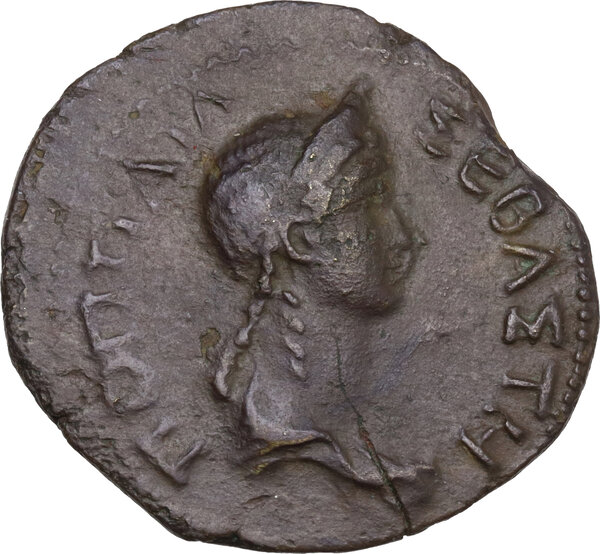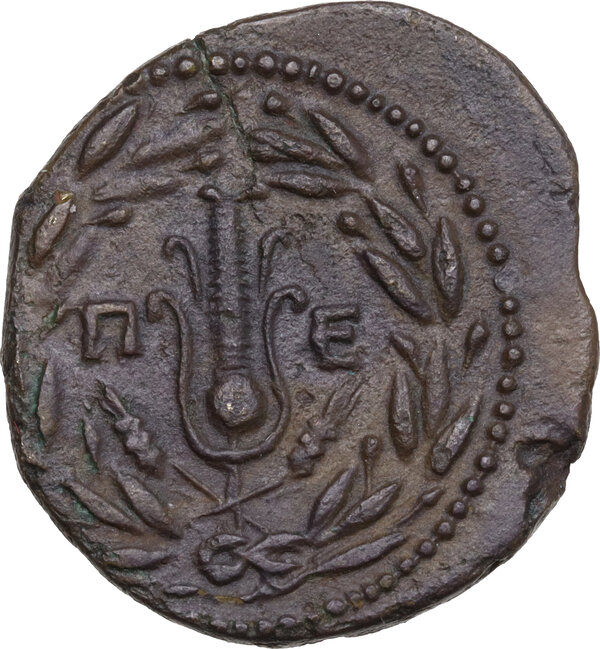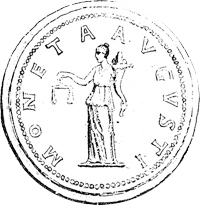

Poppaea, second wife of Nero (died 65 AD). AE 27 mm. Perinthus mint, Thrace. Reign of Nero, 59-63 AD. Obv. ΠOΠΠAIA ΣEBAΣTH. Diademed and draped bust right. Rev. Π-E. Headdress of Isis between two corn-ears within laurel wreath. RPC I 1756; Varbanov III 27. 8.47 g. 27.00 mm. R. Rare. A very attractive example, in excellent condition for issue. Nice even brown patina. VF/About EF. The second wife of Nero, Poppaea Sabina, is described by the historian Tacitus as having possessed “every asset except goodness”. She was a beautiful young woman with hair the colour of amber, who was rumored to have bathed in the milk of asses. Tacitus continues: “ From her mother, the loveliest woman of her day, she inherited distinction and beauty. Her wealth, too, was equal to her birth. She was clever and pleasant to talk to. She seemed respectable. But her life was depraved (…). To her, married or bachelor bedfellow were alike. She was indifferent to her reputation- yet insensible to men's love, and herself unloving. Advantage dictated the bestowal of her favours.”
Poppaea (…) originally was married to the praetorian prefect Rufrius Crispinus, by whom she bore a child. But she was seduced away from Crispinus by the futur emperor Otho, an extravagant young man who was one of Nero's closest friends. This seduction was quickly transformed into marriage (…).
In 58 Nero seduced Poppaea and sent Otho to govern Lusitania so as to distance him from Rome. For the next four years Nero continued to tolerate his politically important but personally unfulfilling marriage to Claudia Octavia (…).
Both Nero and Poppaea dissolved their existing marriages in 62, and 12 days later they were married (…). In short order the royal couple produced a daughter, Claudia Neronis, who was born at Antium, probably early in 63. Nero's joy was so great that the infant was hailed Augusta along with her mother (…) but Claudia died four months later.
By 65 Poppaea had become pregnant again, and Nero could anticipate having a child to replace Claudia and possibly an heir to the throne. However, in the summer of that year, after having been chastised for returning so late from the races, Nero delivered a swift to Poppaea's stomach that proved fatal for both mother and fetus. By all accounts, Nero loved Poppaea deeply and was anxiously awaiting the birth of their second child, which have led some to believe the kick was “disguided”. After this grave national disaster, Nero promptly deified Poppaea as well as her unborned child.
Although Poppaea possessed certain enviable attributes, few mourned her death. The death of Poppaea marked the beginning of Nero's period of great cruelty, which would last three years before he was finally murdered.
Poppaea (…) originally was married to the praetorian prefect Rufrius Crispinus, by whom she bore a child. But she was seduced away from Crispinus by the futur emperor Otho, an extravagant young man who was one of Nero's closest friends. This seduction was quickly transformed into marriage (…).
In 58 Nero seduced Poppaea and sent Otho to govern Lusitania so as to distance him from Rome. For the next four years Nero continued to tolerate his politically important but personally unfulfilling marriage to Claudia Octavia (…).
Both Nero and Poppaea dissolved their existing marriages in 62, and 12 days later they were married (…). In short order the royal couple produced a daughter, Claudia Neronis, who was born at Antium, probably early in 63. Nero's joy was so great that the infant was hailed Augusta along with her mother (…) but Claudia died four months later.
By 65 Poppaea had become pregnant again, and Nero could anticipate having a child to replace Claudia and possibly an heir to the throne. However, in the summer of that year, after having been chastised for returning so late from the races, Nero delivered a swift to Poppaea's stomach that proved fatal for both mother and fetus. By all accounts, Nero loved Poppaea deeply and was anxiously awaiting the birth of their second child, which have led some to believe the kick was “disguided”. After this grave national disaster, Nero promptly deified Poppaea as well as her unborned child.
Although Poppaea possessed certain enviable attributes, few mourned her death. The death of Poppaea marked the beginning of Nero's period of great cruelty, which would last three years before he was finally murdered.


